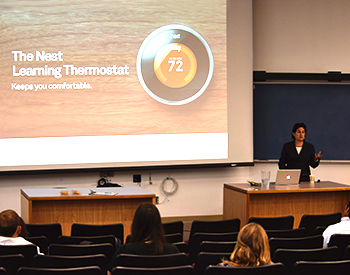Ensuring students are ahead of the curve

Working behind the scenes, GPS’s Professional Development Committee is dedicated to dreaming up how to make students stand out in the workforce
Dec. 19, 2016 | By Sarah Pfledderer | GPS News
From measures as small as requiring students to wear name tags and as impressive as delivering students to employers’ doorsteps across the country, the Career Services team at the UC San Diego School of Global Policy and Strategy (GPS) embeds professional development training into nearly every aspect of its programming.
Now, as an added layer working behind the scenes, the School’s Professional Development Committee serves as yet another benchmark to ensure students are ahead of the curve upon entering the workforce.
“The value of this committee is its ability to connect the academic content of our GPS curriculum with the needs of employers.”—GPS Professor Craig McIntosh
“This committee was put together to make sure students are getting the best possible professional development opportunities we can provide,” said GPS Career Services Director David Robertson, who founded the committee. “It makes sure that everyone’s voice is being heard.”
Producing tangible outcomes
“The value of this committee is its ability to connect the academic content of our GPS curriculum with the needs of employers,” said GPS Professor Craig McIntsoh, who serves as the faculty lead on the committee. “I’ve been trying to identify the feasible, high-value opportunities where we can add to the GPS curriculum in ways that will meaningfully advance the skill sets of our students.”
Doubling as the chair of GPS’s Faculty Curriculum Committee, McIntosh is ideally positioned to do just that. Foremost, he has guided the Professional Development Committee’s efforts to expand students’ data analysis skills.
To that end, the School now offers a Data Science Certificate to students, taught through the UC San Diego Library.
The course, offered in winter quarter, features three modules, each taught over three weeks: one on R, one on Python/SQL, and one that provides a set of Data Carpentry skills.
“Moving forward, we are taking the advice of the private-sector employers on the Professional Development Committee to look more carefully at how to build R into GPS’s quantitative curriculum,” McIntosh said. “This is a package that is of use both in commercial applications and in research.”
 Another tangible result from the committee is the School’s Certificate in Entrepreneurship, launched in spring quarter 2016 and now offered every fall quarter for the foreseeable future.
Another tangible result from the committee is the School’s Certificate in Entrepreneurship, launched in spring quarter 2016 and now offered every fall quarter for the foreseeable future.
Available in conjunction with the UC San Diego Office of Innovation and Commercialization, the Certificate in Entrepreneurship is held as five two-hour classes and is meant to meet students’ mounting interest in social impact and entrepreneurship.
It is led by Greg Horowitt, UC San Diego director of innovation and CEO of T2 Venture Creation, and Paul Roben, associate vice chancellor for innovation and commercialization at UC San Diego, with local entrepreneurs and business practitioners as guest speakers.
Also formulated from the committee is a leadership and management program, to be offered for the first time in spring quarter 2017. The program will focus on soft skills such as supervising people, running meetings and managing projects, to name a few lessons.
Backing the committee mission
For students such as Rick Ferrera, 2017 MIA candidate, physically attending the Professional Development Committee meetings has been instructive in itself.
“It’s very valuable as an opportunity for alumni to highlight the skills their organizations need and what they look for when hiring, for professors to share their perspective on how they think about building opportunities to develop those skills into their courses, and for students to give feedback on their experiences,” Ferrera said.
Matt Hill ‘04, director of talent acquisition at Dexcom, who doubles as an alumni and employer representative on the committee added: “There are so many different perspectives and professional development needs that it takes a group approach like this to distill out what will do the most good for the most students.”
“It takes a group approach like this to distill out what will do the most good for the most students.”—Matt Hill ’04
Hill, with his experience in leading Dexcom’s recruiting division, brings to the committee an outlook on the actual skills and tools employees need to be competitive in the workplace today.
Most importantly, Ferrera concluded, the committee reaffirms the School’s commitment to prepare students as best as possible to enter into their desired careers.
“Professors, administrators and alumni are engaged in ongoing conversations about how they should be baking professional skills into the GPS curriculum,” Ferrera said. “If students take full advantage of that, it has the potential to be a differentiating factor out in the workplace.”
And there’s no reason not to take advantage, Robertson said, “After all, students aren’t being charged additionally for this!”
Those voices include GPS faculty members, alumni, current students and local employer representatives who serve on the committee, which was created just around a year ago. These handpicked committee members meet two to three times a year to evaluate and brainstorm how to ramp up professional development offerings at the School—albeit as a complement to or as part of the GPS curriculum.

